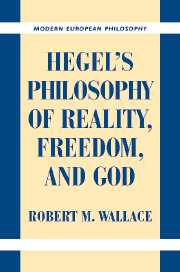Book contents
- Frontmatter
- Contents
- Acknowledgments
- Publication Citation Style
- Preface
- 1 Introduction
- 2 Naturalism, Plato, Kant, and Hegel on Reason, Freedom, Responsibility, Ethics, and God
- 3 Reality, Freedom, and God (Science of Logic I)
- 4 Identity, Contradiction, Actuality, and Freedom (Science of Logic II)
- 5 Freedom, God, and the Refutation of Rational Egoism (Science of Logic III)
- 6 Nature, Freedom, Ethics, and God (The Philosophy of Nature and the Philosophy of Spirit)
- 7 Conclusion
- Index
- Frontmatter
- Contents
- Acknowledgments
- Publication Citation Style
- Preface
- 1 Introduction
- 2 Naturalism, Plato, Kant, and Hegel on Reason, Freedom, Responsibility, Ethics, and God
- 3 Reality, Freedom, and God (Science of Logic I)
- 4 Identity, Contradiction, Actuality, and Freedom (Science of Logic II)
- 5 Freedom, God, and the Refutation of Rational Egoism (Science of Logic III)
- 6 Nature, Freedom, Ethics, and God (The Philosophy of Nature and the Philosophy of Spirit)
- 7 Conclusion
- Index
Summary
Our Commitment to Individualism and Our Problems with It
Thinking for Oneself. In this short chapter, I will survey the major issues that this book will address – plus some additional issues in social philosophy that Hegel analyzes in his Philosophy of Right but that I won't have room to discuss in this book – in order to draw attention to Hegel's commitment to modern “individualism” as an indispensable point of departure, containing truths that must not be abandoned, though they must certainly be interpreted in ways that go beyond initial schematic or (as Hegel would put it) “abstract” formulations.
We tend to think that a person's decisions about what to believe should be based on her own thinking, rather than being a result of just taking things on authority. The idea of thinking for oneself is a major ingredient in the ideal of individual freedom. However, when we attempt to think objectively about the world as a whole, including ourselves as parts of that world, we may find reasons to wonder whether the idea of thinking for oneself is compatible with what we seem to learn about ourselves as parts of the world. Representatives of empirical sciences such as biology and psychology regularly tell us that there is no such thing as freedom. Even philosophers for whom freedom is an absolutely central concern, such as Kant, despair of explaining how it could be compatible with a scientific view of reality.
- Type
- Chapter
- Information
- Hegel's Philosophy of Reality, Freedom, and God , pp. 1 - 9Publisher: Cambridge University PressPrint publication year: 2005



